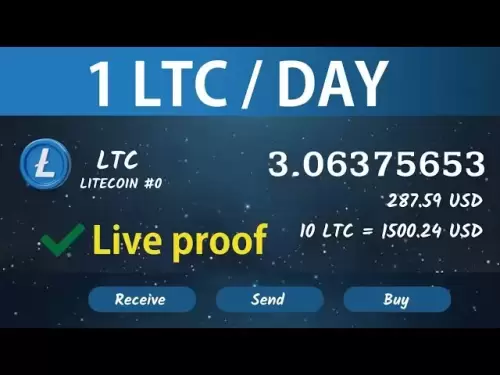-
 Bitcoin
Bitcoin $118900
0.42% -
 Ethereum
Ethereum $3710
-2.88% -
 XRP
XRP $3.513
-2.96% -
 Tether USDt
Tether USDt $1.000
-0.01% -
 Solana
Solana $203.0
3.65% -
 BNB
BNB $765.5
-1.29% -
 USDC
USDC $0.9998
0.00% -
 Dogecoin
Dogecoin $0.2671
-4.18% -
 Cardano
Cardano $0.8817
-3.63% -
 TRON
TRON $0.3139
-0.64% -
 Hyperliquid
Hyperliquid $44.34
-5.45% -
 Stellar
Stellar $0.4637
-4.08% -
 Sui
Sui $3.908
-2.59% -
 Chainlink
Chainlink $19.34
-2.62% -
 Hedera
Hedera $0.2712
-3.77% -
 Avalanche
Avalanche $24.97
-4.13% -
 Bitcoin Cash
Bitcoin Cash $519.8
-1.48% -
 Shiba Inu
Shiba Inu $0.00001518
-3.74% -
 Litecoin
Litecoin $115.6
-2.21% -
 Toncoin
Toncoin $3.460
3.68% -
 UNUS SED LEO
UNUS SED LEO $8.977
-0.07% -
 Polkadot
Polkadot $4.460
-2.96% -
 Uniswap
Uniswap $10.53
-5.43% -
 Ethena USDe
Ethena USDe $1.001
0.01% -
 Monero
Monero $323.6
-0.36% -
 Pepe
Pepe $0.00001379
-2.60% -
 Bitget Token
Bitget Token $4.772
-3.90% -
 Dai
Dai $0.9999
0.00% -
 Aave
Aave $307.5
-6.66% -
 Bittensor
Bittensor $441.8
0.84%
OKX vs kucoin
OKX and KuCoin both offer robust crypto trading platforms, with OKX excelling in advanced tools and security, while KuCoin stands out for user-friendliness and community engagement.
Jul 18, 2025 at 10:42 pm
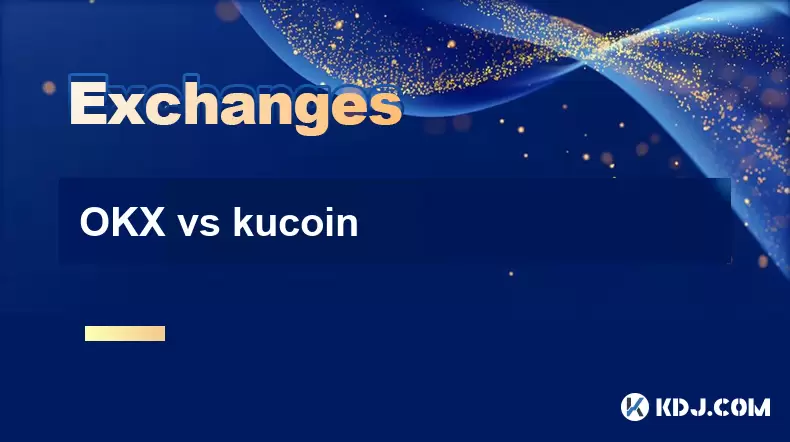
Overview of OKX and KuCoin
When comparing OKX and KuCoin, two of the most prominent cryptocurrency exchanges, it's important to understand their foundational differences and what each platform brings to the table. OKX, formerly known as OKEx, has long been recognized for its robust trading infrastructure and a wide range of supported cryptocurrencies. KuCoin, on the other hand, has carved a niche for itself with a user-friendly interface and a strong emphasis on community-driven features. Both platforms cater to a global audience, but their approach to services, fees, and security varies significantly.
User Interface and Experience
The user interface (UI) and user experience (UX) are critical factors when choosing a cryptocurrency exchange. OKX offers a highly customizable and advanced trading interface, making it a preferred choice for experienced traders. The platform includes features like multi-chart layouts, advanced order types, and real-time market data, which are essential for technical analysis. KuCoin, while also offering a sophisticated trading environment, is often praised for its clean and intuitive interface, especially for beginners. The exchange provides a simple trading view, easy navigation, and mobile app integration that enhances accessibility for new users.
Supported Cryptocurrencies and Trading Pairs
One of the key aspects of any cryptocurrency exchange is the number and variety of supported cryptocurrencies and trading pairs. OKX boasts an extensive list of over 300+ cryptocurrencies, including major coins like Bitcoin (BTC), Ethereum (ETH), and Solana (SOL), as well as numerous altcoins and emerging tokens. The exchange also supports a wide array of fiat-to-crypto and crypto-to-crypto trading pairs, giving users flexibility in how they trade. KuCoin is similarly expansive, offering access to over 400 cryptocurrencies and a vast number of trading pairs. Notably, KuCoin is known for listing newer and less mainstream tokens, which can be attractive for investors looking for early access to emerging projects.
Fee Structures and Transaction Costs
Understanding the fee structures of OKX and KuCoin is essential for users aiming to maximize their trading profits. Both exchanges employ a maker-taker fee model, but the specific rates differ. OKX offers tiered fees based on 30-day trading volume, starting at 0.10% for takers and 0.08% for makers, with reductions for higher volumes. KuCoin, meanwhile, maintains a slightly lower base fee, starting at 0.10% for takers and 0.09% for makers, also with volume-based discounts. Additionally, KuCoin allows users to pay fees with its native token, KCS, for further reductions. OKX offers a similar benefit using its OKB token.
Security Features and Fund Protection
Security is a top priority for any cryptocurrency exchange, and both OKX and KuCoin have implemented robust measures to protect user funds. OKX utilizes cold storage for the majority of its assets, along with two-factor authentication (2FA), email verification, and anti-phishing codes. The platform also has a transparent security history, with no major breaches reported in recent years. KuCoin has also made significant strides in security, including the introduction of a Secure Asset Fund for Users (SAFU) to protect against potential losses. Like OKX, KuCoin supports 2FA, KYC verification, and IP whitelisting to enhance account security.
- Enable two-factor authentication (2FA) for all accounts
- Use cold storage wallets for long-term holdings
- Regularly review account activity logs
- Set up email and SMS alerts for withdrawals
Customer Support and Community Engagement
Customer support and community engagement can significantly impact the user experience on a cryptocurrency exchange. OKX offers 24/7 customer support through live chat, email, and an extensive FAQ section. The platform also maintains an active presence on social media channels, including Twitter, Telegram, and WeChat, to keep users informed. KuCoin is known for its responsive customer service team, with support available in multiple languages. The exchange also fosters a strong community presence, offering user forums, educational content, and AMA (Ask Me Anything) sessions with project teams.
- Access live chat support during peak trading hours
- Join official Telegram groups for real-time updates
- Participate in AMA sessions for direct communication with developers
- Explore community-driven trading competitions
Frequently Asked Questions (FAQ)
1. Can I trade futures on both OKX and KuCoin?
Yes, both OKX and KuCoin offer futures trading with leverage options. OKX provides a more advanced futures trading interface, while KuCoin offers a user-friendly experience for both beginners and experienced traders.
2. Do OKX and KuCoin support fiat currency deposits?
Yes, both exchanges support fiat deposits through various methods, including bank transfers, credit/debit cards, and third-party payment processors. However, the availability of specific fiat currencies may vary depending on your region.
3. Are there staking and yield farming options on OKX and KuCoin?
Both platforms offer staking services for various cryptocurrencies. OKX provides flexible and fixed-term staking products, while KuCoin offers Staking, Pool-X, and Lending options for users to earn passive income.
4. How do I verify my account on OKX and KuCoin?
Both exchanges require KYC (Know Your Customer) verification for higher withdrawal limits and access to certain features. The process involves submitting government-issued ID documents, proof of address, and sometimes a selfie for identity confirmation.
Disclaimer:info@kdj.com
The information provided is not trading advice. kdj.com does not assume any responsibility for any investments made based on the information provided in this article. Cryptocurrencies are highly volatile and it is highly recommended that you invest with caution after thorough research!
If you believe that the content used on this website infringes your copyright, please contact us immediately (info@kdj.com) and we will delete it promptly.
- PNC Bank & Coinbase: Banking on Crypto's Future, NYC Style
- 2025-07-23 06:30:12
- Ruvi AI: The Next Avalanche Riding the AI and Blockchain Wave?
- 2025-07-23 06:30:12
- SEC, Bitcoin, and Crypto: Navigating the Wild West of Digital Finance
- 2025-07-23 04:30:12
- BlockDAG Mining Revolution: 10x Rewards and Crypto's Next Big Thing?
- 2025-07-23 06:10:12
- Tyre Legalities, the 20p Test, and Expert Advice: Staying Safe on the Road
- 2025-07-23 04:50:12
- Liberty Head Double Eagle Proofs: A Golden Opportunity?
- 2025-07-23 04:55:12
Related knowledge
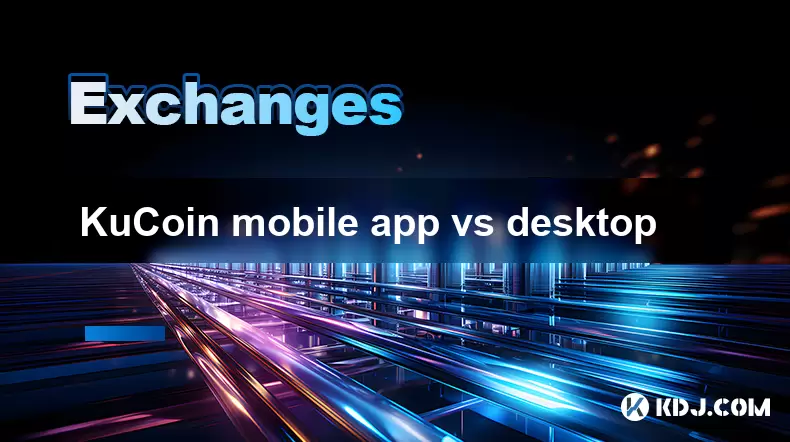
KuCoin mobile app vs desktop
Jul 19,2025 at 08:35am
Overview of KuCoin Mobile App and Desktop PlatformThe KuCoin ecosystem offers both a mobile app and a desktop platform, each designed to cater to diff...
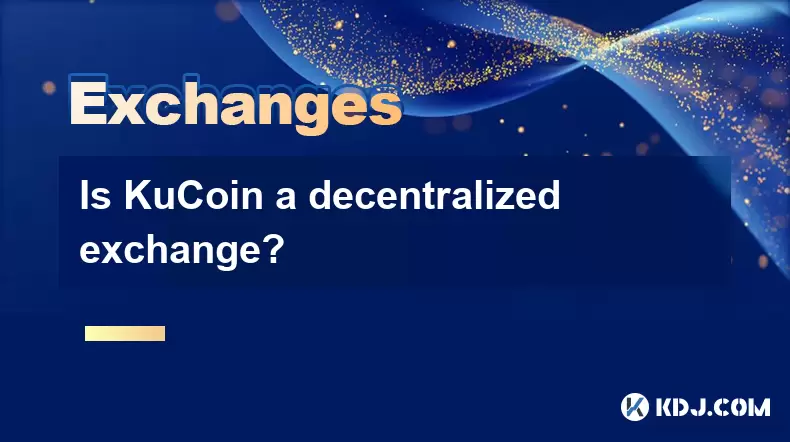
Is KuCoin a decentralized exchange?
Jul 18,2025 at 03:15pm
Understanding Decentralized Exchanges (DEXs)To determine whether KuCoin is a decentralized exchange, it's essential to first understand what defines a...
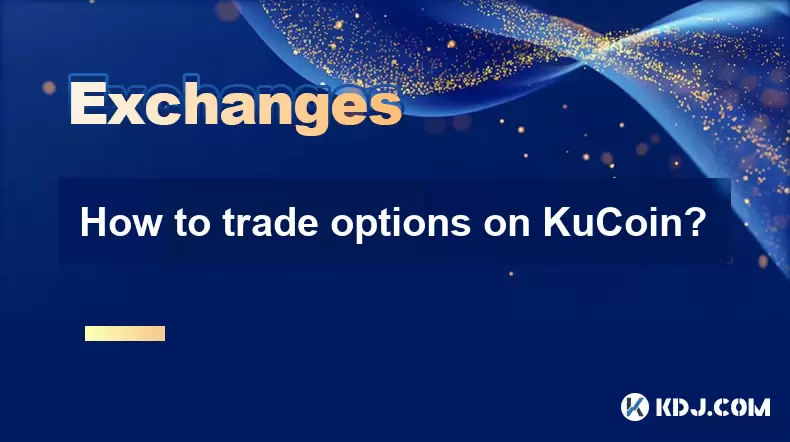
How to trade options on KuCoin?
Jul 19,2025 at 03:42am
Understanding Options Trading on KuCoinOptions trading on KuCoin allows users to speculate on the future price movements of cryptocurrencies without o...
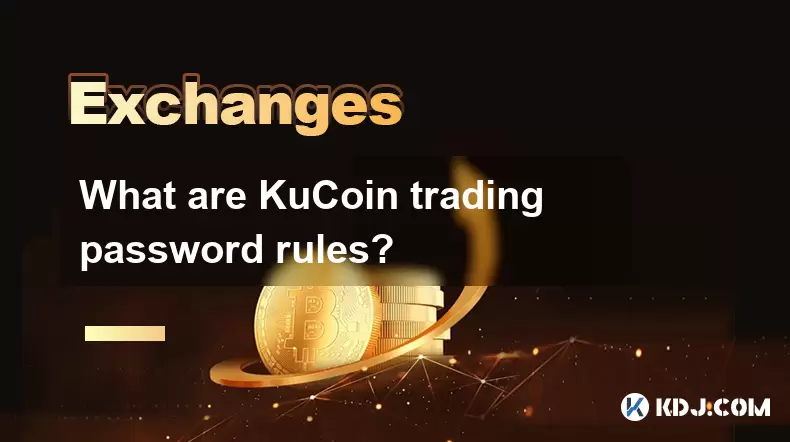
What are KuCoin trading password rules?
Jul 20,2025 at 07:56am
Understanding the Purpose of a Trading Password on KuCoinOn KuCoin, a trading password serves as an additional layer of security beyond the standard l...

Who is the CEO of KuCoin?
Jul 20,2025 at 09:35am
Background of KuCoinKuCoin is one of the largest cryptocurrency exchanges globally, known for its diverse range of trading pairs and user-friendly int...
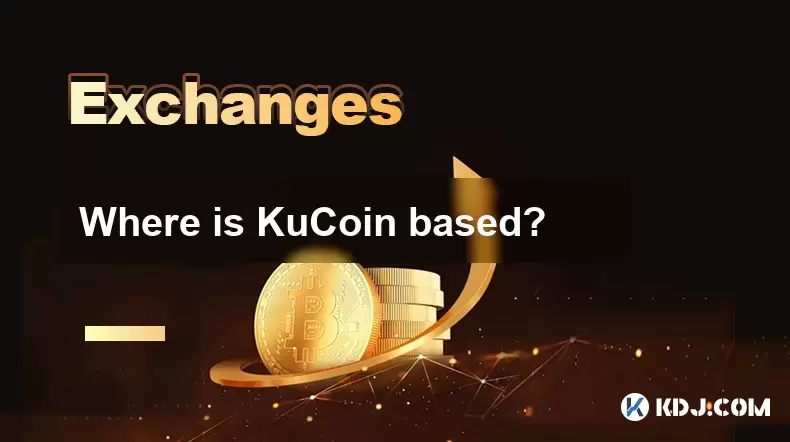
Where is KuCoin based?
Jul 22,2025 at 10:35pm
Understanding KuCoin's Global PresenceKuCoin is one of the most recognized names in the cryptocurrency exchange market, serving millions of users glob...

KuCoin mobile app vs desktop
Jul 19,2025 at 08:35am
Overview of KuCoin Mobile App and Desktop PlatformThe KuCoin ecosystem offers both a mobile app and a desktop platform, each designed to cater to diff...

Is KuCoin a decentralized exchange?
Jul 18,2025 at 03:15pm
Understanding Decentralized Exchanges (DEXs)To determine whether KuCoin is a decentralized exchange, it's essential to first understand what defines a...

How to trade options on KuCoin?
Jul 19,2025 at 03:42am
Understanding Options Trading on KuCoinOptions trading on KuCoin allows users to speculate on the future price movements of cryptocurrencies without o...

What are KuCoin trading password rules?
Jul 20,2025 at 07:56am
Understanding the Purpose of a Trading Password on KuCoinOn KuCoin, a trading password serves as an additional layer of security beyond the standard l...

Who is the CEO of KuCoin?
Jul 20,2025 at 09:35am
Background of KuCoinKuCoin is one of the largest cryptocurrency exchanges globally, known for its diverse range of trading pairs and user-friendly int...

Where is KuCoin based?
Jul 22,2025 at 10:35pm
Understanding KuCoin's Global PresenceKuCoin is one of the most recognized names in the cryptocurrency exchange market, serving millions of users glob...
See all articles























